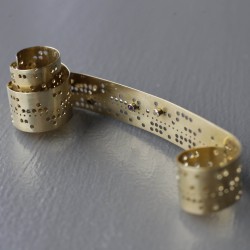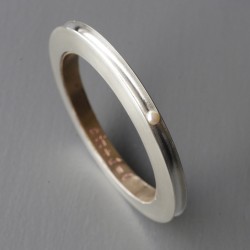By Jenna Stevens-Smith
October 8, 2018
Time to read: 5 minutes
On 8 October 2018, 11 scientists from across the UK will be presented with hand-crafted jewellery at the Suffrage Science awards ceremony held at the British Library, London. The awards celebrate women in maths and computing and encourage others to enter science and reach senior leadership roles.
Last week was an excellent week for senior female scientists, with a Nobel Prize in Physics for Dr Donna Strickland, University of Waterloo and a Nobel Prize in Chemistry for Professor Frances Arnold, California Institute of Technology. However, despite these successes, women are still underrepresented in senior leadership roles.

Solving the pipeline issue is a long-term challenge for maths and computing with female students making up only 15% of undergraduate computer science students and 37% of mathematical sciences students in 2016/17, compared to 61% of Biological Sciences students.
The Suffrage Science scheme was initiated by Professor Dame Amanda Fisher, Director of the MRC London Institute of Medical Sciences in 2011, who said:
“The creation of the Maths and Computing Suffrage Sciences Awards in 2016 recognised the increasing importance of mathematics and computing to the life sciences. As in all branches of the awards their purpose is to celebrate female scientists, their scientific achievements and ability to inspire others. This is especially important in maths and computing where female students studying these subjects are still in the minority. We are delighted to welcome this year’s awardees into the growing Suffrage Science community and look forward to supporting them to inspire the next generation.”
The Suffrage Science scheme was initiated in 2011, with a focus on women in the life sciences. In 2013 the scheme expanded to recognise women in engineering and physical sciences. Then on Tuesday 11 October 2016, a date recognised globally as Ada Lovelace Day, the scheme expanded again, with a third strand, recognising women in mathematics and computing. Today, the eve of Ada Lovelace Day, marks the first handover of the maths and computing Suffrage Science awards.

The 11 awardees are chosen by the previous award holders for their scientific achievements and ability to inspire others. The awards themselves are items of jewellery created by students at Central St Martins, who worked with scientists to design pieces inspired by research and the Suffragette movement. The jewellery is passed on as heirlooms from one female scientist to the next, below are reasons for two of the nominations.
“This award is about forming networks of inspiring women to support others – a description that fits Eugenie perfectly – she has constantly supported me and so many others.” Professor Gwyneth Stallard, Open University on her nomination of Dr Eugenie Hunsicker, Loughborough University.
“Ursula has done more for women in science and particularly maths and computer science than anyone I know, I can’t think of a better person to hand over my Suffrage Science award to.” Professor Dame Wendy Hall, University of Southampton on her nomination of Professor Ursula Martin, University of Oxford.
Full lists of 2018 recipients and 2016 holders are below:
The 2018 award winners are:
| Dr Ruth Keogh | London School of Hygiene and Tropical Medicine |
| Dr Tereza Neocleous | University of Glasgow |
| Dr Nina Snaith | University of Bristol |
| Dr Daniela De Angelis | MRC Biostatistics Unit, University of Cambridge |
| Dr Eugenie Hunsicker | Loughborough University |
| Professor Sally Fincher | University of Kent |
| Professor Julie McCann | Imperial College London |
| Professor Jane Hillston | University of Edinburgh |
| Professor Ursula Martin | University of Oxford |
| Dr Hannah Dee | Aberystwyth University |
| Dr Vicky Neale | University of Oxford |
The current award holders (2016) were:
| Professor Christl Donnelly | Imperial College London |
| Professor Jane Hutton | University of Warwick |
| Professor Frances Kirwan | University of Oxford |
| Professor Sylvia Richardson | MRC Biostatistics Unit, University of Cambridge |
| Professor Gwyneth Stallard | Open University |
| Professor Ann Blandford | University College London |
| Professor Muffy Calder | University of Glasgow |
| Professor Leslie Goldberg | University of Oxford |
| Professor Dame Wendy Hall | University of Southampton |
| Professor Carron Shankland | University of Stirling |
| Professor Dame Celia Hoyles | University College London |
In addition to the presentation of the awards, host and former BBC journalist Susan Watts will lead a discussion about the most striking positive developments and ongoing challenges faced by women in maths and computing. New recipient, Professor Ursula Martin, University of Oxford will discuss her new book ‘Ada Lovelace: The making of a Computer Scientist’. Alongside inaugural awardees Professor Carron Shankland, University of Stirling who will share her experience of gender diversity in computing and the value of networks. While Professor Dame Celia Hoyles, University College London will share her insights on the current landscape of mathematics education and explore areas where more action is needed.
Further information about the Suffrage Science awards scheme can be found here: https://lms.mrc.ac.uk/public-engagement/suffrage-science
If you would like further information about the awards please contact Dr Jenna Stevens-Smith, Head of Communications and Engagement at the MRC London Institute of Medical Sciences.
Contact
Name: Jenna Stevens-Smith
Mobile: 07714 051 445